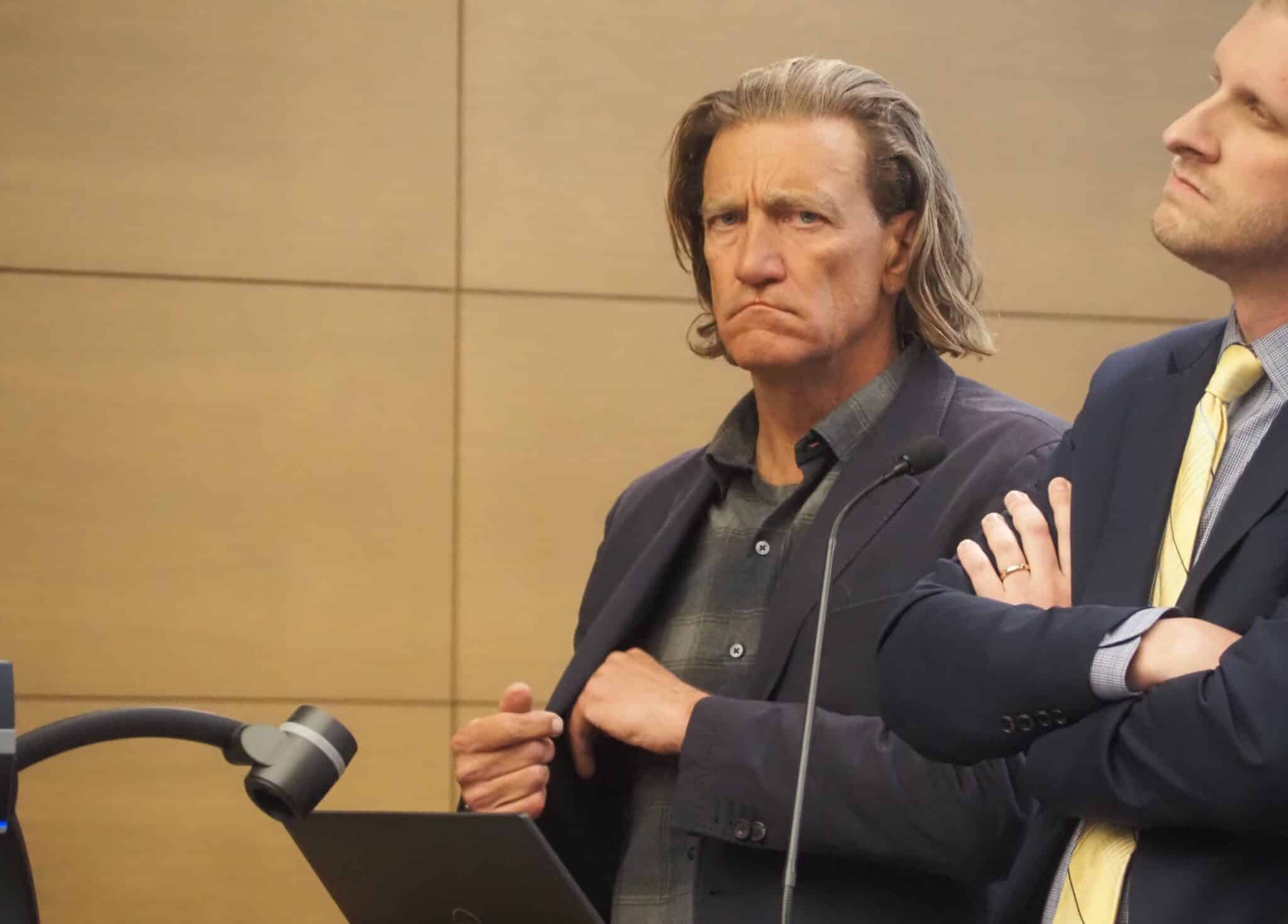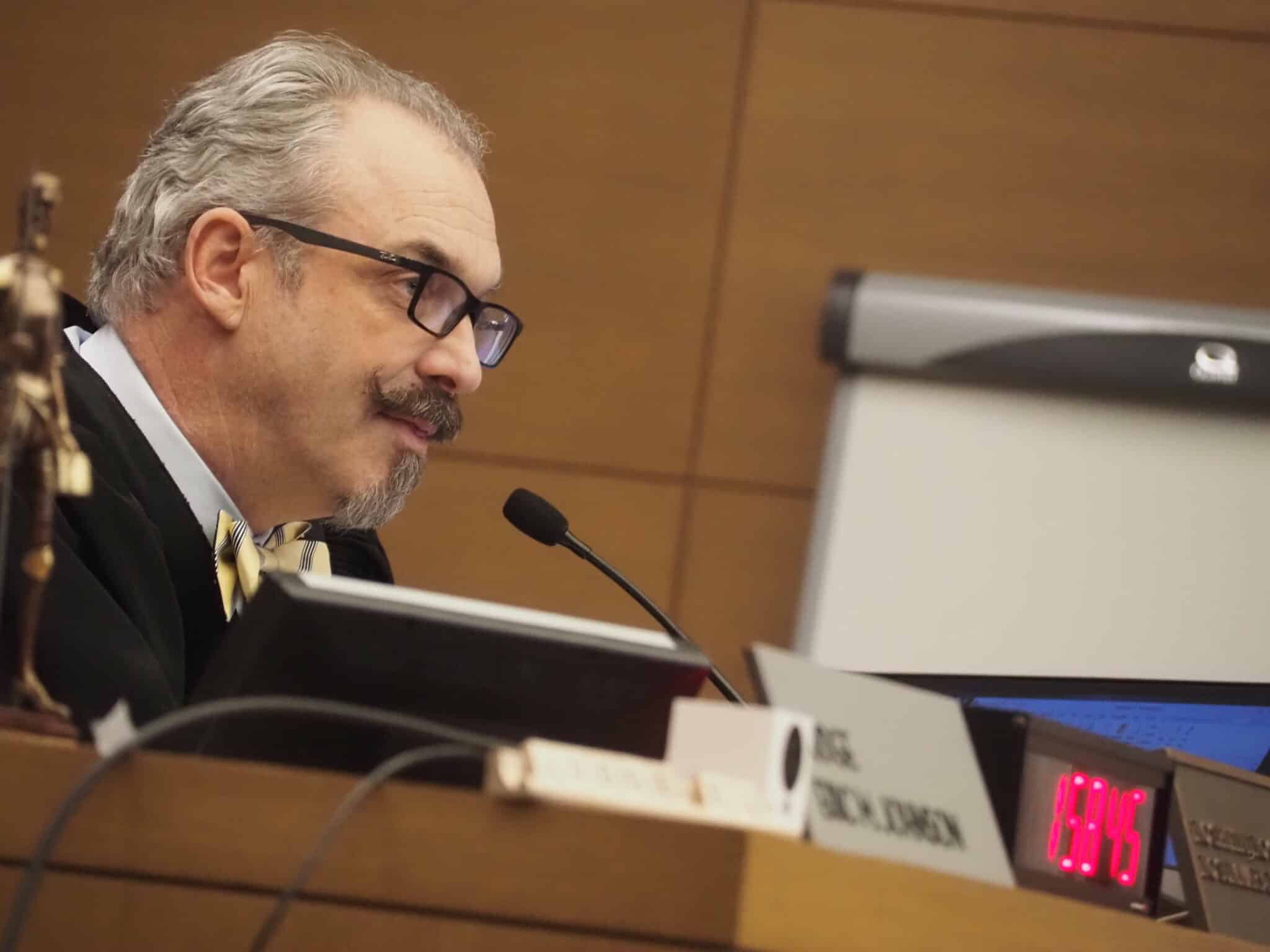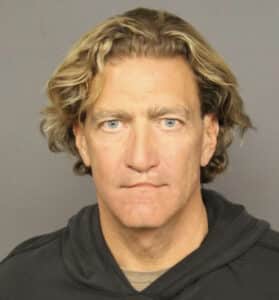
Steve Bachar, then 57, eyes the crowd during a hearing in Denver District Court on Friday, March 10, 2023. (Justin Wingerter/BusinessDen)
Steve Bachar — a former White House staffer, disbarred Denver lawyer and accused pandemic fraudster — was sentenced to three years in prison Monday for stealing $125,000.
Bachar, 58, sniffled and apologized as he asked for “mercy” from Judge Eric Johnson before the punishment was handed down. In a seven-minute speech, his first public remarks about the case since being charged in 2021, Bachar called himself “deeply remorseful.”
“Nothing is an excuse for my actions. I blame no one else and take full responsibility,” he said.
Six years ago, in October 2017, Bachar talked an old friend named Jamie Lindsay into investing $125,000 in Bachar’s company, Empowerment Capital. Bachar did not have authority to sell a stake in the company, misrepresented the risks associated with that investment, and then spent most of Lindsay’s money on personal expenses, he admitted earlier this year.
“I am fed up,” Lindsay testified at Monday’s sentencing. “This admitted felon, Steve Bachar, began to lie to me six years ago. It has been six years and the lies did not stop.”
Lindsay, speaking virtually and before Bachar, told the judge that Bachar would lie “to limit his punishment so that he can keep defrauding more and more people without end.” Lindsay asked for a six-year prison term and warned that a light sentence would let Bachar reoffend.
“Some day Bachar will get out of jail and start anew. I will have to live with the consequences of his crimes for the rest of my life. I ask that you hear my plea and sentence this unrepentant liar, thief and fraudster to the longest sentence that you can,” Lindsay said.
As he considered possible punishments for Bachar, Johnson had to contend with Bachar’s legal past. On the one hand, the felony theft charge was his first criminal conviction. On the other hand, Bachar has been ordered by judges to pay more than $5 million in recent years to three people and companies who sued him for allegedly taking their money.

Denver District Court Judge Eric Johnson listens to testimony during a sentencing hearing on Friday, March 10, 2023. (Justin Wingerter/BusinessDen)
“What we have here is a pattern of conduct that has continued year after year after year,” Deputy District Attorney Ashley Beck told the judge. “Despite civil judgments and despite warnings to him that this conduct cannot continue, he has engaged in it.”
Beck urged the judge to sentence Bachar to two years in a state prison.
“We hold law enforcement to a higher standard and we should also be holding lawyers to a higher standard,” she said. “It is a disservice to the profession and a disservice to the public, who quite frankly already view lawyers and the judicial system with skepticism.”
But Robert Swestka, the public defender representing Bachar, stressed that Johnson should consider only the case before him — the theft from Lindsay. He urged the judge to ignore letters written by other people allegedly victimized by Bachar, calling them “a band of disgruntled investors looking to rake Mr. Bachar’s name through the mud one more time.”
“The finer details of this case paint the picture of a man who took on too much and perhaps was a little too cavalier with other people’s money as his company struggled to make returns on investment,” he said. “Mr. Bachar is not a criminal mastermind or a grand schemer.”
As he made his case for a sentence of probation rather than prison time, Swestka downplayed the odds of his client committing fraud again. “The extensive publicity” around Bachar in recent years will allow any future business partners to know all about him, Swestka noted.
“Frankly, Mr. Bachar would have no opportunity to reofffend, even if he wanted to. But beyond the ability to reoffend, Mr. Bachar has absolutely no interest in ever engaging in conduct of this nature again. This entire process has been embarrassing and humiliating,” he said.
Swestka added that Bachar “harbors no ambition to lead a tabloid-esque, high-flying lifestyle.”
Bachar, speaking after his attorney, similarly said that he has been “living hand to mouth.” He pledged to repay the $182,808 that he owes Lindsay in a few months if sentenced to probation, a promise that was met with snickers and eyerolls by Bachar critics in the courtroom.
“I have experienced public shame and humiliation, which I believe was deserved,” he said.
When it was the judge’s time to speak, Johnson agreed with Swestka that he cannot consider lawsuits and court judgments that have been filed against Bachar. He then bemoaned that it is “incredibly rare” for “corporate thieves” like Bachar to be charged with crimes.
“The damage wrought by these white-collar crimes gets lost in our society, with our focus on the war on drugs, with our focus on street crime. The damage to individuals, whether it’s hundreds of thousands or millions of dollars — how many home invasions would it take to get to $180,000?” he wondered aloud, referring to what Bachar owes Lindsay. “How many street-level drug deals does it take to get to $180,000? How many stolen cars?”
Johnson has shown a willingness this year to criticize both Bachar and the judicial system. In March, he threw out a plea agreement that would have allowed Bachar to avoid prison because, Johnson said, “many in our community steal much less and go to prison or to jail.”
The judge said Monday that too often in American society, there are two classes of people: “Those who are subject to our laws but not protected by them and those who are protected by our laws but not subject to them.” People in the second category can include graduates of Emory University and Georgetown Law, he said. Bachar graduated from both.
“They are people who are given responsibilities in corporations and can then abuse that, the way that you have,” Johnson told the defendant. “At least in this courtroom, I am not going to have people who are protected by laws but are not subject to them.”
With that, he sentenced Bachar to three years in prison, three years of probation and $182,808 in restitution. A Denver sheriff’s deputy then handcuffed Bachar and led him out.
“I do wish you luck, sir,” Johnson said. “I do wish that I never see you back in court again.”
After Monday morning’s hearing, Lindsay said that he was “gratified” by the sentence.
“I am heartened by the judge’s thoroughness and his desire to create some level of justice in this case,” said Lindsay, who now lives in North Carolina, “and also impressed by the prosecutor’s determination to hold Bachar to account for his actions.”

Steve Bachar, then 57, eyes the crowd during a hearing in Denver District Court on Friday, March 10, 2023. (Justin Wingerter/BusinessDen)
Steve Bachar — a former White House staffer, disbarred Denver lawyer and accused pandemic fraudster — was sentenced to three years in prison Monday for stealing $125,000.
Bachar, 58, sniffled and apologized as he asked for “mercy” from Judge Eric Johnson before the punishment was handed down. In a seven-minute speech, his first public remarks about the case since being charged in 2021, Bachar called himself “deeply remorseful.”
“Nothing is an excuse for my actions. I blame no one else and take full responsibility,” he said.
Six years ago, in October 2017, Bachar talked an old friend named Jamie Lindsay into investing $125,000 in Bachar’s company, Empowerment Capital. Bachar did not have authority to sell a stake in the company, misrepresented the risks associated with that investment, and then spent most of Lindsay’s money on personal expenses, he admitted earlier this year.
“I am fed up,” Lindsay testified at Monday’s sentencing. “This admitted felon, Steve Bachar, began to lie to me six years ago. It has been six years and the lies did not stop.”
Lindsay, speaking virtually and before Bachar, told the judge that Bachar would lie “to limit his punishment so that he can keep defrauding more and more people without end.” Lindsay asked for a six-year prison term and warned that a light sentence would let Bachar reoffend.
“Some day Bachar will get out of jail and start anew. I will have to live with the consequences of his crimes for the rest of my life. I ask that you hear my plea and sentence this unrepentant liar, thief and fraudster to the longest sentence that you can,” Lindsay said.
As he considered possible punishments for Bachar, Johnson had to contend with Bachar’s legal past. On the one hand, the felony theft charge was his first criminal conviction. On the other hand, Bachar has been ordered by judges to pay more than $5 million in recent years to three people and companies who sued him for allegedly taking their money.

Denver District Court Judge Eric Johnson listens to testimony during a sentencing hearing on Friday, March 10, 2023. (Justin Wingerter/BusinessDen)
“What we have here is a pattern of conduct that has continued year after year after year,” Deputy District Attorney Ashley Beck told the judge. “Despite civil judgments and despite warnings to him that this conduct cannot continue, he has engaged in it.”
Beck urged the judge to sentence Bachar to two years in a state prison.
“We hold law enforcement to a higher standard and we should also be holding lawyers to a higher standard,” she said. “It is a disservice to the profession and a disservice to the public, who quite frankly already view lawyers and the judicial system with skepticism.”
But Robert Swestka, the public defender representing Bachar, stressed that Johnson should consider only the case before him — the theft from Lindsay. He urged the judge to ignore letters written by other people allegedly victimized by Bachar, calling them “a band of disgruntled investors looking to rake Mr. Bachar’s name through the mud one more time.”
“The finer details of this case paint the picture of a man who took on too much and perhaps was a little too cavalier with other people’s money as his company struggled to make returns on investment,” he said. “Mr. Bachar is not a criminal mastermind or a grand schemer.”
As he made his case for a sentence of probation rather than prison time, Swestka downplayed the odds of his client committing fraud again. “The extensive publicity” around Bachar in recent years will allow any future business partners to know all about him, Swestka noted.
“Frankly, Mr. Bachar would have no opportunity to reofffend, even if he wanted to. But beyond the ability to reoffend, Mr. Bachar has absolutely no interest in ever engaging in conduct of this nature again. This entire process has been embarrassing and humiliating,” he said.
Swestka added that Bachar “harbors no ambition to lead a tabloid-esque, high-flying lifestyle.”
Bachar, speaking after his attorney, similarly said that he has been “living hand to mouth.” He pledged to repay the $182,808 that he owes Lindsay in a few months if sentenced to probation, a promise that was met with snickers and eyerolls by Bachar critics in the courtroom.
“I have experienced public shame and humiliation, which I believe was deserved,” he said.
When it was the judge’s time to speak, Johnson agreed with Swestka that he cannot consider lawsuits and court judgments that have been filed against Bachar. He then bemoaned that it is “incredibly rare” for “corporate thieves” like Bachar to be charged with crimes.
“The damage wrought by these white-collar crimes gets lost in our society, with our focus on the war on drugs, with our focus on street crime. The damage to individuals, whether it’s hundreds of thousands or millions of dollars — how many home invasions would it take to get to $180,000?” he wondered aloud, referring to what Bachar owes Lindsay. “How many street-level drug deals does it take to get to $180,000? How many stolen cars?”
Johnson has shown a willingness this year to criticize both Bachar and the judicial system. In March, he threw out a plea agreement that would have allowed Bachar to avoid prison because, Johnson said, “many in our community steal much less and go to prison or to jail.”
The judge said Monday that too often in American society, there are two classes of people: “Those who are subject to our laws but not protected by them and those who are protected by our laws but not subject to them.” People in the second category can include graduates of Emory University and Georgetown Law, he said. Bachar graduated from both.
“They are people who are given responsibilities in corporations and can then abuse that, the way that you have,” Johnson told the defendant. “At least in this courtroom, I am not going to have people who are protected by laws but are not subject to them.”
With that, he sentenced Bachar to three years in prison, three years of probation and $182,808 in restitution. A Denver sheriff’s deputy then handcuffed Bachar and led him out.
“I do wish you luck, sir,” Johnson said. “I do wish that I never see you back in court again.”
After Monday morning’s hearing, Lindsay said that he was “gratified” by the sentence.
“I am heartened by the judge’s thoroughness and his desire to create some level of justice in this case,” said Lindsay, who now lives in North Carolina, “and also impressed by the prosecutor’s determination to hold Bachar to account for his actions.”

